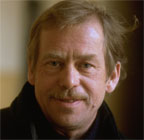 As the Czech Republic and the wider world bids Václav Havel goodbye,
As the Czech Republic and the wider world bids Václav Havel goodbye,
Pavel Theiner, whose father George worked tirelessly to shine a light on the work of Czech dissidents throughout his editorship at Index on Censorship, looks back on a remarkable man
Under several editors Index on Censorship was at the forefront of publicising the fate (as well as the work of) Václav Havel. One of Index’s editors, in fact, translated one of Havel’s plays into English and helped to produce it at the Orange Tree in London in the 1980s. As I write this, on the day of Václav Havel’s death, many genuine tears are flowing in the Czech Republic, with thousands of people out in the streets of Prague and other cities calmly and in an extremely dignified fashion placing candles and remembering a playwright/politician who stood head-and-shoulders above such men as Václav Klaus. There are (and will be) crocodile tears too.
Václav Havel can be criticised for a number of things, not least having compromised with the communists in 1989/1990, leaving history in many ways untouched. But Havel’s behaviour throughout the 1970s and 1980s was courageous, being one of only a few thousand people in the country willing to stand head-on against the totalitarian regime. And, above all, he always acted for what he thought was Czechoslovakia’s and the Czech Republic’s best national interests. And that is where the comparison is crucial with Václav Klaus, undoubtedly the most able manipulator of political power post-1990. Whilst Václav Havel was instrumental in helping his country face westwards by joining NATO and the EU, Václav Klaus has at all times favoured Russian interests (note the Czech Republic’s struggle in becoming less dependent on Russia for energy sources as well as the huge imminent contract in developing the Temelín nuclear power station).
Václav Havel may have been popular in the world-at-large but his popularity remained high at home too, even during his tenure as the Czech president, where pragnatism sometimes has to play a role. Václav Havel was seen by many of his compatriots as carrrying the Masaryk traditon into the modern era. TG Masaryk, the founder of the Czechoslovak Republic and admired throughout the 1920s and 1930s, ended up being idealised during the communist and post-communist eras as a counter-balance to the totaliitarian brutality, greyness and moral decay.
Václav Havel’s health was always fairly fragile and his sojourns in several Czechoslovak jails contributed to the respiratory problems that he encountered as a middle-aged man. Only top-notch health care in Austria and the Czech Republic ensured that Václav Haved lived as long as he did. He will always stand out as a moral beacon who remained at all times well-intentioned and tolerant — he was a man who found it extremely difficult to hate his enemies and lacked (to his credit) the bile which would have allowed him to attack his opponents. May he rest in peace.




